

The Senate has approved on third and final reading the bill extending government programs designed to fight the coronavirus disease (COVID-19).
Senate Bill (SB) 1564 or the Bayanihan to Recover as One Act (Bayanihan 2) will effectively extend validity of the government’s COVID-19 programs and interventions under Republic Act 11469 or the Bayanihan to Heal as One Act, which lapsed on June 5, 2020.
The measure grants the same concessions provided under Bayanihan Act 1 but includes new provisions such as grants for regulatory fees, including reduction in rates through removal of value-added tax (VAT) and local taxes, and fees and charges imposed by any regulatory agency and local government unit (LGU).
As with the first Bayanihan to Heal Act, SB 1564 will once more:
- exempt medical supplies and equipment from import duties and taxes
- liberalize grant of incentives for the manufacture or importation of critical or needed equipment or supplies, including healthcare equipment
- ensure availability of essential goods, in particular food and medicine, by adopting measures necessary to facilitate and/or minimize supply chain disruption
- move deadlines and timelines for the filing and submission of any document, payment of taxes, fees, and other charges required by law, and the grant of any benefit to ease the burden on individuals under community quarantines.
New under Bayanihan 2 is the Department of Transportation (DOTr) and other agencies’ ability to extend the following assistance to critically impacted businesses in the transportation industry:
- emergency credit lines to fund operations
- low interest loans or long-term credit facility for debt restructuring and rehabilitation
- credit guarantee schemes to guarantee bank loans and credit lines
- grants for applicable regulatory fees
- substitution of refund option to travel vouchers
- grants for fuel subsidy, as may be necessary
- grants for training, equipment, facilities, test kits and necessary personnel to cope with increased health risks arising from infectious diseases
The loan and/or loan guarantee programs and other loan-related measures that will be provided under Bayanihan 2 should be used exclusively for critically impacted business in the transportation industry.
The DOTr is also directed to:
- produce a master list of all displaced and critically-impacted transport workers under the road, rail, air and maritime sectors to effectively implement distribution of wage subsidies and cash-for-work program;
- work with financial institutions for possible restructuring of loans without penalty and provide credit lines and low interest loans to help critically-impacted transport service providers; and
- coordinate with transport service providers and LGUs to negotiate service contracting of public utility vehicles (PUV) as a form of temporary livelihood to workers displaced by restrictions and reduced capacity of public transportation, and other forms of arrangement to ensure preservation of livelihood in the transport sector.
The proposed law also prohibits the phaseout–at the national and local level–of any type of PUV as the industry transitions to a new normal.
In addition to funds that will be raised under Section 3 of Bayanihan 2 worth P140 billion, a P236-billion standby fund will be appropriated to support operation and response measures to address the COVID-19 pandemic. Of this total, P15 billion will support wholesale banking and equity infusion of the Development Bank of the Philippines for low-interest loans to be extended to persons and entities engaged in industries affected by the pandemic, including air, land and sea transportation, retail, trade, accommodation and tourism services and micro, small, and medium enterprises.
“With Bayanihan 2, the government would be assured of sufficient funding for the ramped up testing for COVID-19 and for contact tracing. It will also ensure that our valiant health workers who contract or succumb to the disease will continuously receive financial support,” SB 1564 principal author Juan Edgardo Angara said.
The measure also allows government to continue providing assistance to Filipino businesses and workers impacted by the pandemic, including repatriated or suspended OFWs.
Once signed into law, Bayanihan 2 will be effective until September 30.
The House of Representatives has yet to pass their counterpart bill. – Roumina Pablo




